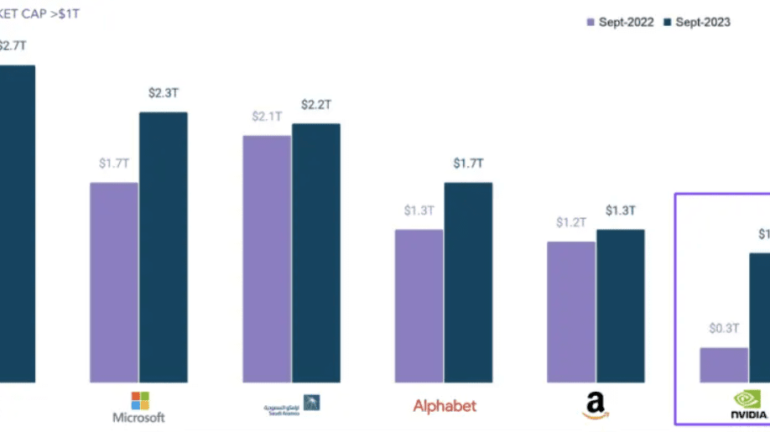TL;DR:
- US tech giants, including Apple, Microsoft, Alphabet, Amazon, and Nvidia, saw their market caps soar by $2.4 trillion in 2023.
- Nvidia, with its high-performance chips powering generative AI models, crossed the $1 trillion valuation mark.
- Accel’s Euroscape index, featuring cloud and SaaS leaders like Salesforce and Palantir, rose by 29%.
- Recovery post-pandemic: Public multiples, funding, and unicorn companies returned to pre-Covid levels.
- Generative AI, led by innovations like OpenAI’s ChatGPT, drove tech performance in 2023.
- Tech companies shifted focus to profitability due to rising interest rates, impacting growth rates.
- Regulatory scrutiny limited deal-making, with only 10 Big Tech transactions in 2023.
Main AI News:
In the realm of technology, AI’s profound impact has surged US tech giants’ market capitalizations by a staggering $2.4 trillion in 2023. This transformational shift, largely fueled by the fervor surrounding generative artificial intelligence, is illuminated in a recent report unveiled by venture capital stalwart Accel.
Accel’s annual Euroscape report unveils a compelling narrative – prominent technology behemoths like Apple, Microsoft, Alphabet, Amazon, and Nvidia witnessed an impressive 36% year-over-year surge in their share prices. Notably, Nvidia, the US chip giant, breached the trillion-dollar milestone for the first time, firmly establishing itself with a valuation exceeding $1 trillion. The bedrock of Nvidia’s ascension lies in its high-performance chips, instrumental in powering advanced generative AI models capable of producing fresh content from extensive volumes of training data.
Meanwhile, Accel’s Euroscape index, featuring colossal players in the cloud and software-as-a-service (SaaS) domain, such as Salesforce, Palantir, and Unity, recorded a remarkable 29% surge in the year-to-date period. This resurgence signals a stark contrast to the previous year, which witnessed cloud and SaaS entities losing a staggering $1.6 trillion in value, as investors embarked on a pivot away from high-growth tech stocks, as per Accel’s observations. Today, there are glimpses of respite on the horizon.
An intriguing parallel emerges when one considers the swift recovery witnessed in the tech landscape. The tech-laden Nasdaq Composite, notes Accel, reclaimed 80% of its all-time high within a mere 18 months, showcasing a faster bounce-back trajectory compared to the aftermath of the dotcom bubble burst in the 1990s. Notably, it had taken around 14 long years for Nasdaq to achieve that milestone, as meticulously documented by Accel.
The metrics are painting a promising picture – public multiples for Euroscape entities have reverted to a 10-year pre-Covid average of 6.1 times the next twelve months’ revenue. Furthermore, funding for cloud and SaaS enterprises in Europe, Israel, and the US has also reverted to pre-Covid levels, signifying a robust resurgence.
In the words of Philippe Botteri, partner at Accel, “We are in a very different time than 2000. If you look back at 2000, it really took a long time … for the Nasdaq to get back to 80% of its peak. And now, after the 2021 reset, it only took 18 months to get there.”
Indeed, 2023 has emerged as the year of AI. The driving force behind the resounding performance of cloud and SaaS entities, according to Accel, is none other than artificial intelligence. It comes as no surprise, given the buzz around generative AI tools such as OpenAI’s ChatGPT, Google’s Bard, and Anthropic’s Claude. These generative AI innovations are fundamentally reshaping the software landscape. As Philippe Botteri asserts, “Generative AI is something that is really redefining software… You should really think about this as something that is pervasive.”
The United States has steered the charge in generative AI funding deals, with OpenAI and Anthropic successfully securing billions in investments. OpenAI took the lead with an impressive $10 billion, closely followed by Inflection with $1.3 billion raised. Notably, Europe made its mark, with France producing three of the most substantial generative AI funding rounds—Hugging Face ($235 million), Poolside ($126 million), and Mistral AI ($113 million).
The emergence of unicorn companies has surged back to pre-Covid levels, and generative AI is taking a prominent role in this resurgence. In Europe and Israel, a remarkable 40% of new unicorns operate in the generative AI space, while in the United States, this figure soars to an astonishing 80%.
However, this year has presented its share of challenges for the tech sector, with fundraising and valuations experiencing sharp declines as investors grew increasingly cautious. Tech companies, traditionally inclined towards prioritizing growth and expansion over short-term profits, found themselves at a crossroads. Rising interest rates, elevating the cost of capital, prompted investors to redirect their funds away from high-growth bets. Consequently, Euroscape companies witnessed their growth rates plummet from an average of 68% in the first quarter of 2021 to 23% in the second quarter of 2023. Remarkably, free cash flow saw a turnaround, moving from an average of -9% to a positive +5% in the same period.
For tech giants, deal-making in 2023 encountered obstacles as regulators intensified scrutiny, expressing concerns about their exponential growth. The number of transactions involving Big Tech companies dwindled to a mere 10, a stark contrast to previous years. In 2021, FAANG-led acquisitions stood at 27, and in 2022, there were 26 significant deals involving Big Tech. One deal that encountered substantial regulatory pressure was Microsoft’s ambitious bid to acquire Activision Blizzard, the gaming juggernaut behind iconic titles like “Call of Duty,” “Candy Crush,” and “Crash Bandicoot.” After a protracted battle, the two entities finally sealed the deal, aided by British regulators’ approval.
Conclusion:
The surge in US tech giants’ market capitalization driven by generative AI signifies a remarkable rebound from previous setbacks. The return to pre-Covid levels in public multiples, funding, and the emergence of unicorn companies paints a promising picture for the tech sector. However, the shift toward profitability and increased regulatory scrutiny pose challenges, highlighting the need for agile strategies in this evolving market landscape.

